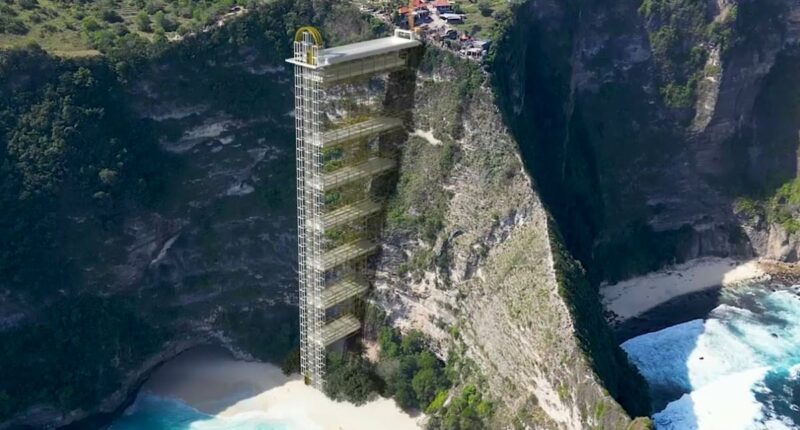Share this @internewscast.com
In a surprising turn of events, a partially built glass elevator intended to provide tourists with easy access to a popular Bali beach will be dismantled. The decision comes amidst growing concerns over environmental impact and regulatory breaches.
Bali’s Governor, Wayan Koster, revealed on Sunday that the 182-meter Kelingking Glass Elevator Project is set for demolition following significant building violations identified last month. This decision aims to protect the natural beauty of the site, which has already suffered from construction-induced damage.
Reports indicate that the project has caused irreversible harm to the iconic cliffs at Kelingking Beach, recognized as one of Bali’s most breathtaking and unspoiled attractions, according to The Bali Sun.
The Governor has instructed PT Indonesia Kaishi Tourism Property Investment Development Group, the firm responsible for the development, to dismantle the structure within a six-month timeframe.
The controversial project, which also includes a 64-meter bridge, began last year on Nusa Penida, an island located southeast of Bali. The $1.4 million initiative was originally intended to assist tourists in navigating the steep, picturesque cliffs known for their ‘T-Rex’ shape, down to the beach below.
The US$1.4million project was designed to assist beachgoers in traversing the scenic cliffside, dubbed the ‘T-Rex’ for its unique shape, down to the beachfront.
Local official previously raised concerns with the project, following claims appropriate permits may not have been obtained before works began.
Governor Koster on Sunday said an investigation had revealed five violations related to spatial issues, permits, environmental law, licencing and culture-based tourism.

Construction of a giant glass elevator at Kelingking Beach in Nusa Penida has been ordered to stop

Authorities on Sunday ordered the elevator be completely demolished within six months
Pictures of the project had triggered outrage from local beachgoers – blaming tourism for spoiling yet another beloved site.
‘I can’t (sic) no longer recommend a visit to Kelingking Beach on Nusa Penida,’ one Balinese wrote on social media.
‘Unfortunately, the breathtaking, pristine views that made this location famous are being compromised by the construction of a large, intrusive glass viewing lift.’
‘Do we want to turn this island into just another commercial hub for investors?’ another woman wrote.
‘I still remember when this place felt wild – untouched, almost sacred,’ Dutch expat Twan van Halm wrote on Instagram.
‘When the climb down made your heart race and every step reminded you that beauty takes effort. Now it’s all signs, selfies, shortcuts.’
Others questioned the need for the project to begin with, claiming the true dangers came from swimming off the beach rather than scaling its cliffs.
‘Many tourists experience accidents because they go down,’ local woman Made Sediana told the Bali Sun newspaper.
Locals earlier voiced concern the iconic beach could be permanently ruined by the massive construction project

The project was found to be violating several building laws
‘If it were easier for guests to go down, it would be dangerous too.
‘The coastline is narrow there, and big waves come suddenly. The best way to enjoy Kelingking Beach’s beauty is from above.’
Only last month, a 32-year-old French tourist drowned after being swept away by strong currents off Kelingking Beach.
The project previously drew accusations the government is prioritising tourist infrastructure over the desires of locals.
Questions of overtourism surfaced following devastating floods in September, after planning experts suggested fast-tracked construction, including in tourist hotspots, had stripped the land of its natural flood resistance.
‘There is so much tourist accommodation being built, and according to our records, much of it is built by violating coastal zones, river zones and often these developments are located in disaster-prone areas,’ Walhi Bali executive director Krisna Dinata told the ABC.
He added: ‘Even in the eyes of the world, Bali is seen as a case of overtourism.’
Bali placed as the number one destination not to visit in 2025 on Fodors Magazine’s ‘no list’, with overtourism and ‘unchecked development’ as its key reasons.
‘Once-pristine beaches like Kuta and Seminyak are now buried under piles of trash, with local waste management systems struggling to keep up,’ it said.
Despite the backlash, Bali is expected to receive 6.5million foreign tourists this year, setting a new annual record and well exceeding its local population of 4.4million.

















